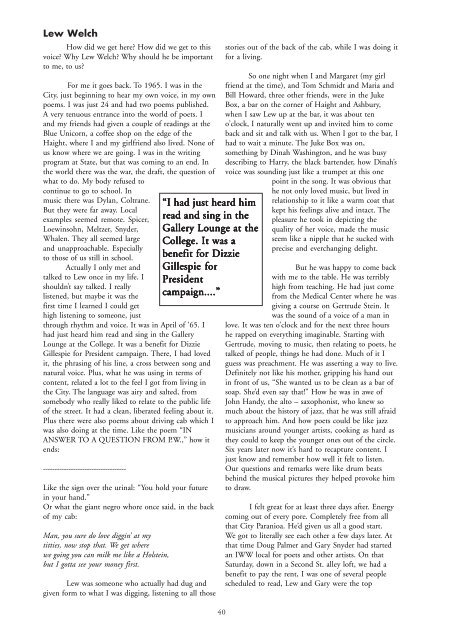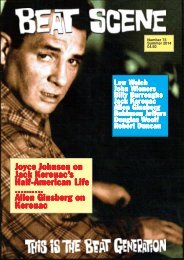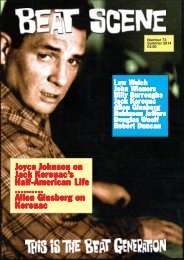You also want an ePaper? Increase the reach of your titles
YUMPU automatically turns print PDFs into web optimized ePapers that Google loves.
Lew Welch<br />
How did we get here? How did we get to this<br />
voice? Why Lew Welch? Why should he be important<br />
to me, to us?<br />
For me it goes back. To 1965. I was in the<br />
City, just beginning to hear my own voice, in my own<br />
poems. I was just 24 and had two poems published.<br />
A very tenuous entrance into the world of poets. I<br />
and my friends had given a couple of readings at the<br />
Blue Unicorn, a coffee shop on the edge of the<br />
Haight, where I and my girlfriend also lived. None of<br />
us know where we are going. I was in the writing<br />
program at State, but that was coming to an end. In<br />
the world there was the war, the draft, the question of<br />
what to do. My body refused to<br />
continue to go to school. In<br />
music there was Dylan, Coltrane.<br />
But they were far away. Local<br />
examples seemed remote. Spicer,<br />
Loewinsohn, Meltzer, Snyder,<br />
Whalen. They all seemed large<br />
and unapproachable. Especially<br />
to those of us still in school.<br />
Actually I only met and<br />
talked to Lew once in my life. I<br />
shouldn’t say talked. I really<br />
listened, but maybe it was the<br />
first time I learned I could get<br />
high listening to someone, just<br />
through rhythm and voice. It was in April of ’65. I<br />
had just heard him read and sing in the Gallery<br />
Lounge at the College. It was a benefit for Dizzie<br />
Gillespie for President campaign. There, I had loved<br />
it, the phrasing of his line, a cross between song and<br />
natural voice. Plus, what he was using in terms of<br />
content, related a lot to the feel I got from living in<br />
the City. The language was airy and salted, from<br />
somebody who really liked to relate to the public life<br />
of the street. It had a clean, liberated feeling about it.<br />
Plus there were also poems about driving cab which I<br />
was also doing at the time. Like the poem “IN<br />
ANSWER TO A QUESTION FROM P.W.,” how it<br />
ends:<br />
------------------------------------<br />
Like the sign over the urinal: “You hold your future<br />
in your hand.”<br />
Or what the giant negro whore once said, in the back<br />
of my cab:<br />
Man, you sure do love diggin’ at my<br />
titties, now stop that. We get where<br />
we going you can milk me like a Holstein,<br />
but I gotta see your money first.<br />
“I had just heard him<br />
read and sing in the<br />
Gallery Lounge at the<br />
College. It was a<br />
benefit for Dizzie<br />
Gillespie for<br />
President<br />
campaign....”<br />
Lew was someone who actually had dug and<br />
given form to what I was digging, listening to all those<br />
40<br />
stories out of the back of the cab, while I was doing it<br />
for a living.<br />
So one night when I and Margaret (my girl<br />
friend at the time), and Tom Schmidt and Maria and<br />
Bill Howard, three other friends, were in the Juke<br />
Box, a bar on the corner of Haight and Ashbury,<br />
when I saw Lew up at the bar, it was about ten<br />
o’clock, I naturally went up and invited him to come<br />
back and sit and talk with us. When I got to the bar, I<br />
had to wait a minute. The Juke Box was on,<br />
something by Dinah Washington, and he was busy<br />
describing to Harry, the black bartender, how Dinah’s<br />
voice was sounding just like a trumpet at this one<br />
point in the song. It was obvious that<br />
he not only loved music, but lived in<br />
relationship to it like a warm coat that<br />
kept his feelings alive and intact. The<br />
pleasure he took in depicting the<br />
quality of her voice, made the music<br />
seem like a nipple that he sucked with<br />
precise and everchanging delight.<br />
But he was happy to come back<br />
with me to the table. He was terribly<br />
high from teaching. He had just come<br />
from the Medical Center where he was<br />
giving a course on Gertrude Stein. It<br />
was the sound of a voice of a man in<br />
love. It was ten o’clock and for the next three hours<br />
he rapped on everything imaginable. Starting with<br />
Gertrude, moving to music, then relating to poets, he<br />
talked of people, things he had done. Much of it I<br />
guess was preachment. He was asserting a way to live.<br />
Definitely not like his mother, gripping his hand out<br />
in front of us, “She wanted us to be clean as a bar of<br />
soap. She’d even say that!” How he was in awe of<br />
John Handy, the alto – saxophonist, who knew so<br />
much about the history of jazz, that he was still afraid<br />
to approach him. And how poets could be like jazz<br />
musicians around younger artists, cooking as hard as<br />
they could to keep the younger ones out of the circle.<br />
Six years later now it’s hard to recapture content. I<br />
just know and remember how well it felt to listen.<br />
Our questions and remarks were like drum beats<br />
behind the musical pictures they helped provoke him<br />
to draw.<br />
I felt great for at least three days after. Energy<br />
coming out of every pore. Completely free from all<br />
that City Paranioa. He’d given us all a good start.<br />
We got to literally see each other a few days later. At<br />
that time Doug Palmer and Gary Snyder had started<br />
an IWW local for poets and other artists. On that<br />
Saturday, down in a Second St. alley loft, we had a<br />
benefit to pay the rent, I was one of several people<br />
scheduled to read, Lew and Gary were the top





